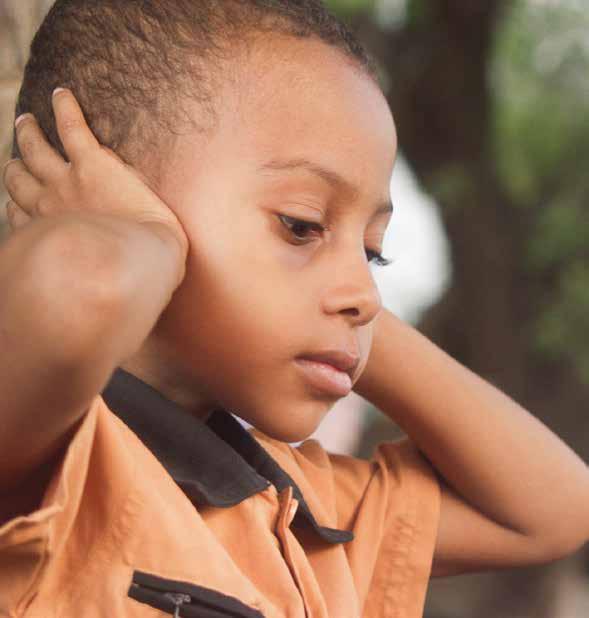
3 minute read
“It’s Abusive”: How Noise Pollution Can Impact Your Health
By Kayla Benjamin WI Climate & Environment Reporter
Living in a city often means accepting the bustle of car horns, construction and sirens. But daily exposure to unwanted sound, especially from loud or constant sources like highways or industrial sites, can have serious mental and physical health impacts. As a result of decades of racist urban planning, low-income communities and people of color in the U.S. tend to live closer to those sources.
To understand more about what noise pollution is and how it can impact our health, the Informer spoke with Dr. Erica Walker, an assistant professor of epidemiology at Brown University. She heads up Brown’s Community Noise Lab, which works to holistically explore the relationship between community noise and public health.
Kayla Benjamin, Washington Informer: Okay, to start, what is noise pollution?
Dr. Erica Walker:
So I am going to take a small step back: Sound is basically anything in our environment that we process through our auditory system. But noise is that part of sound that we have deemed—as individuals or communities—something that’s unwanted. So noise is defined as unwanted sound.
KB: You’ve been studying noise pollution for years now. Why does this issue matter so much?
EW: [Noise] is all around us, it’s ubiquitous. But at the same time, we really have the power to control only a little aspect of it—we can put our headphones in, we can put some earplugs in. But people are so powerless to do anything about it, especially if it’s coming from someplace else. If you’re dealing with it, and you can’t get relief from it, it’s hopeless. And it’s also negatively impacting our health.
KB: Tell me more about that—how does noise impact health?
EW: If you’re exposed to some sort of sound that you deem to be noise, if it’s loud enough, it can knock out your hearing, it can disturb your sleep. And if it can disturb your sleep, that’s where you start to get into those kinds of really negative health impacts.
When we’re in an environment and we’re exposed to some sort of sound that we process as noise, it sets up a stress response, or that flight or fight response.
But if you’re constantly stimulating that stress response over a longer period of time, that can lead to the manifestation of some pretty serious cardiovascular diseases ranging from hypertension, cardiovascular-related mortality, stroke, all kinds of things.
There’s also a lot of literature that shows that there are a lot of mental health and anxiety implications for being in noisy environments.
KB: Can you elaborate on those mental health implications?
EW: When you think about noise being a proxy for powerlessness, that can lead to a bunch of different things. If I can’t control the peace and serenity of my environment, that can lead to all kinds of stressors and anxieties. Whether or not they’re diagnosed, your body is not able to achieve homeostasis, or balance.
When I work with communities, they’re like, ‘I can’t get a night’s sleep, I can’t predict when I’m going to have peace. I can’t control this. I feel like I reported it but nothing’s going to be done.’
So it’s abuse. It’s abusive.
KB: I’ve read some literature looking at noise pollution as an environmental justice issue. Can you tell me what you’ve found in your research?
EW: Some of those sources of sound, the big bucket items will be industrial sources and transportation sources like air, rail, highway road traffic. So when you think about [it], where are those things in our communities? Where are the major highways and the busy roads, where are the industrial [sites]? It’s usually placed in low income communities. We’ve created this, this is an intentional artifact of poor urban planning.
KB: What can be done about this, especially when it comes to highways and road traffic?
EW: Number one, you can practice better urban planning. And two, if you are going to put communities near major highways, then you need to think about some mitigation strategies for the people who live near there. I work with a community up in Massachusetts, where they were arguing for a sound wall. You go through cities, there are sound walls. They’re very expensive, they’re expensive to maintain, I think they cost a really crazy amount of money. But it’s a way to not only mitigate air pollution, but also mitigate sound pollution.
KB: What about on an individual level? Can anything be done beyond headphones and earbuds?
EW: That’s the sad part, because unless you have lots of money to afford a place not by a highway, there’s not much. You can buy mitigation strategies to reduce the sound—you can buy triple pane glass windows. You can organize and get your Department of Transportation to put up a sound wall in your community. [But] I’ve been working with the community that’s been doing this for the past ten years, and it hasn’t moved an inch. So if there is something that you can do, as an individual, you’re going to have to pay for it. And I think that that’s really unfair. n









